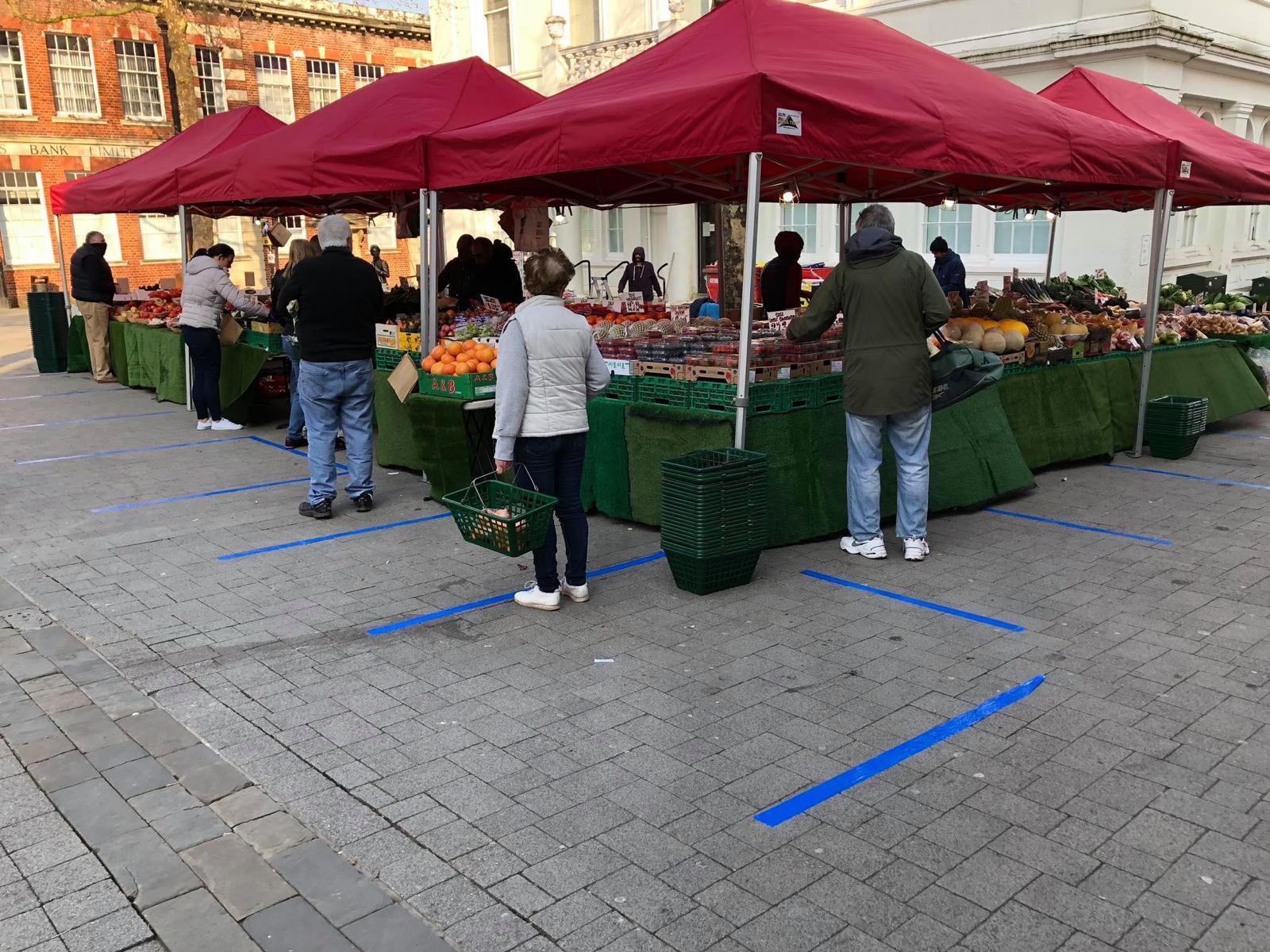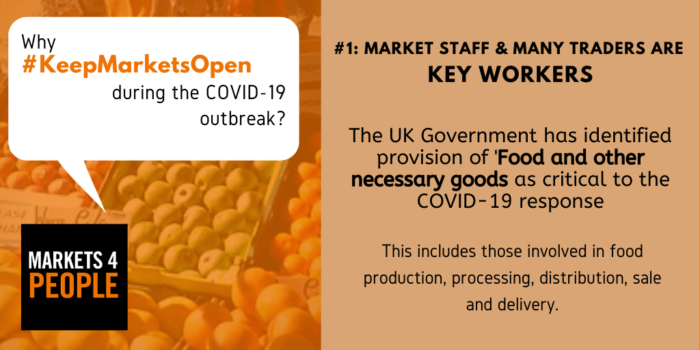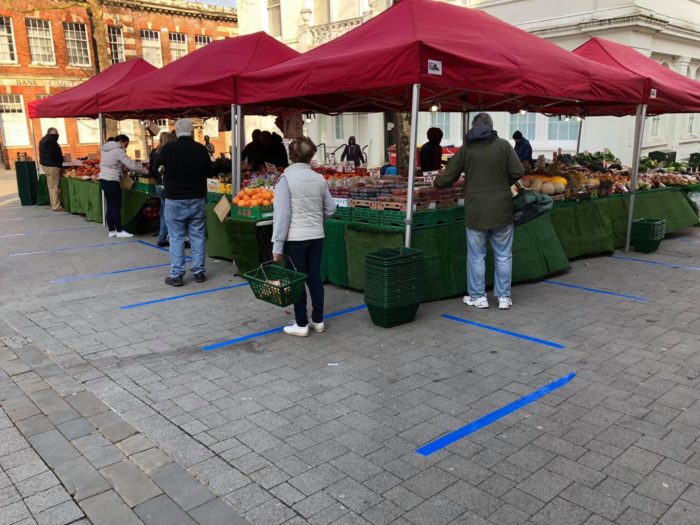Best practice for markets during the COVID-19 outbreak

- Tags
- COVID-19
Developed in collaboration with NMTF
At the time of writing, in the third week of nationwide lockdown in the UK, the Markets4People team is considering how it can best support our partners in the markets sector, who are working hard to advise and advocate on behalf of traders and operators. We had intended to use this blog post to share details of an exciting new project to develop two best-practice handbooks for enhancing community value and setting up and managing community and trader-run markets. Instead, we’ll keep to the best-practice theme and consider the measures that can be put in place to enable markets to continue to serve their communities by supplying good quality, nutritious food and essentials, and many other benefits beside. Many thanks to our colleagues at NMTF for helping us to develop the content for this piece.

Our Twitter campaign on 23rd March urged operators to #KeepMarketsOpen for three key reasons:
- Market staff and many traders are key workers. The UK Government has identified provision of Food and other necessary goods as critical to the COVID-19 response. This includes those involved in food production, processing, distribution, sale and delivery.
- Markets can be as safe as other retail outlets. NABMA maintains that markets are as safe as – if not safer – than many other retail outlets, due to their fresher air atmosphere and the importance that individual traders give to their customers.
With good operational management of markets there is every reason to continue their operation to serve the public.
NABMA, ‘Market Contingency Planning – Coronavirus’ https://nabma.com/market-contingency-planning-coronavirus/
- Markets Support vulnerable people. For instance, our research at Bury Market shows that older people, lower socioeconomic groups and other vulnerable market users rely on the market for social interaction, which enhances their wellbeing. Our research also reflects the greater sense of connection to the community which markets foster, particularly through the relationships between traders and their customers. This is borne out through acts of generosity, like the donation of fresh produce received by charity Emmaus in Mossley, from Ashton Market Hall greengrocer Strawberry Gardens, with assistance from operator Tameside Council’s Operations and Neighbourhoods team. Markets also offer affordable, nutritious food to those on low incomes, as recognized by Alexandra Rose Charity, whose Rose Vouchers scheme currently helps low-income families in three UK cities to buy fresh fruit and vegetables from their local markets.
Despite these arguments, there remain many valid concerns about the safety of keeping markets open, with some operators deciding that the best option is simply to close. However, with the help of NMTF, we have collated some examples of traders and operators who have risen to the challenge and are showing that, in many, many cases this just isn’t necessary. We therefore urge those in the sector to consider the following options and take inspiration from markets across the UK. Of course, every market is unique and will need to take into account its specific layout, customer base and facilities. However, the ideas below are worth consideration in all cases.
Social distancing
As a nation, we're now well used to the ‘2 metre rule’ which specifies the minimum distance which must be maintained between people in public places. NABMA has made a range of digital assets available to download, to remind staff, traders and customers to keep to a safe distance. Markings on the floor make it easier for everyone to do so, as seen here at Basingstoke Market. Market staff can help by monitoring distancing practices.

Social distancing markers at Basingstoke Market
As noted previously, each market is unique, not least in its layout. However guidance shared by the organizers of Growing Communities' farmers' market in Stoke Newington, London, on the Farm Retail Association website, offers a range of practical suggestions, which they have used to keep their weekly market running. These include advance planning to reconfigure the market layout (limiting entrance and exit points and ensuring that queues do not merge), communicating effectively with customers using posters and signage, and bringing in extra staff to ensure that safety measures and social distancing practices are adhered to.
Whilst outdoor markets, which benefit from freely circulating air, will need to rely on social distancing measures to limit the spread of the virus, indoor markets also have the option to monitor their entrances and exits to bar against overcrowding. Limit entry and exit points, as the team at Cardiff Market have done, specify a direction of flow and ensure that fire safety and exit routes are taken into consideration, if access is modified in any way.
Hygiene
 Traders should be regularly cleaning their stalls and equipment. If possible, offer handwashing stations and display reminders to wash hands more frequently, with soap and water, for 20 seconds. Where such facilities cannot be offered to customers, operators such as Bradford’s Oastler Market are providing hand sanitizer. Shoppers should be advised not to touch any products unless they are committed to buying them and, preferably, goods should be packed by traders. Anyone who becomes unwell in the workplace, with a new, continuous cough or a high temperature, should be sent home and advised to isolate.
Traders should be regularly cleaning their stalls and equipment. If possible, offer handwashing stations and display reminders to wash hands more frequently, with soap and water, for 20 seconds. Where such facilities cannot be offered to customers, operators such as Bradford’s Oastler Market are providing hand sanitizer. Shoppers should be advised not to touch any products unless they are committed to buying them and, preferably, goods should be packed by traders. Anyone who becomes unwell in the workplace, with a new, continuous cough or a high temperature, should be sent home and advised to isolate.
Many individual traders have impressed us with their proactive approach to implementing new hygiene measures. For instance, Zero waste wholefood shop The Jar Tree, in Leeds’ Kirkgate Market, continues to offer a refill service but does not currently allow customers to self-serve, as it did previously. Alternatively, 'click and collect’ is available and a delivery service is in the pipeline. It has also stepped up its 5* rated hygiene measures by frequently disinfecting surfaces, dispensers and scoops and accepting only card payments, to minimize contact.
Embrace technology
Industry bodies have long been encouraging market operators and traders to embrace social media and maintain a web presence, equip themselves to take cashless payments, and to consider offering click and collect and delivery. Now, more than ever, NMTF is urging those still able to trade to keep promoting their businesses across social media and to access the guidance available through the members area of its website. To help to get the message out there, both NMTF and NABMA are offering digital assets to use on social media (as well as within the market), promoting clear messages such as ‘Open for Business’, Delivery Service Available, etc.
Offer delivery and/or 'click and collect’
If operators still do not feel that is possible to keep a market open safely, this doesn’t have to mean that trade stops. Instead, traders providing essentials can offer a delivery service, with support and promotion from managers and operators. Furthermore, these services offer customers who need to isolate an alternative to supermarket delivery and can help to reduce travel (particularly for those reliant of public transport) and limit the number of shoppers wishing to enter the market. ACS (the Association of Convenience Stores) recently published guidance on home delivery services for local shops, which could be applied equally to markets.
Warrington Market is among those leading the way, supporting a range of food and essentials traders to deliver a ‘click and collect’ service. At the same time, Warrington Fruit and Veg have begun to offer a delivery service for their most vulnerable customers. Like Warrington, Preston Market has reduced its opening hours to enable traders to coordinate deliveries, whilst maintaining a strong social media presence. Newcastle City Council, meanwhile, having made the difficult decision to close its Grainger Market, quickly establishing the web platform GraingerDelivery.com to coordinate deliveries. As of 3rd April, the team had already sent out 5000 boxes of food and provisions. Of course, some traders, such as greengrocers K.D. Davis and Sons, have long offered a delivery service. However, since the COVID-19 outbreak, it has introduced new measures, such as doorstep only delivery, to safeguard delivery drivers and customers.
Protect businesses by offering grants
In order to quickly support and protect local businesses, Barnsley Council paid out over £19M in grants to over 1762 businesses, ahead of receiving money from central government (which arrived on Thursday 2nd April). Further information is available through Enterprising Barnsley, the business support arm of the council, which is sharing government guidance, additional information and support.
Only traders who are individually liable for business rates will be eligible for the Small Business Grant Scheme but this includes all those receiving rate relief on their units. Traders should contact their local authority business rates team in order to apply. Sadly, not all traders will be eligible for a grant and local authorities cannot give relief or grants to themselves. In this case, we believe there is an even stronger case for councils to waive or discount rents for traders (see below).
Waive rents
Of course, not all markets will remain open and not all traders continue to be able to trade. NMTF are urging all market operators not to charge rent from traders who need to self-isolate, either because they have COVID-19 symptoms or because they are classed as being at-risk, such as those who are over the age of 70, have underlying health conditions or are pregnant. The same applies for those unable to trade because their goods are classed as non-essential. Fortunately, many operators are recognizing that offering a rent-free period will help independent businesses to survive the pandemic, support the sector as a whole and serve the many vulnerable market users who rely on markets.
